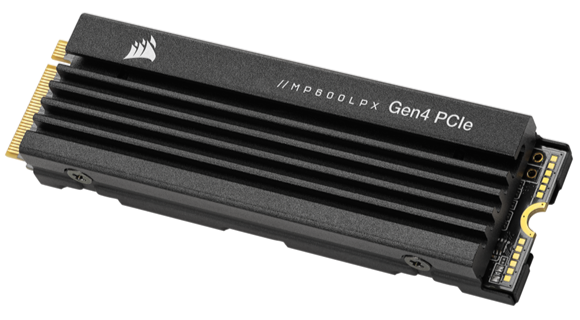Corsair Adds 4TB SKU for PS5-Optimized MP600 Pro LPX SSDs
4TB of storage will cost you nearly as much as two PlayStation 5 Digital Editions at MSRP.
Back in January, Corsair launched the MP600 Pro LPX SSD family, which is compatible with Sony’s PlayStation 5. Not only is the series compliant with minimum read/write speeds, but it also includes a low-profile heatsink as recommended by Sony. When announced, Corsair said that 1TB and 2TB versions would be available priced at $169.99 and $339.99, respectively. Now, the company is doubling up on the latter with a new 4TB SKU.
Compared to the previously-announced members of the MP600 Pro LPX family, the new 4TB SKU maintains the same sequential read performance of 7,100 MBps and sequential write performance of up to 6,800 MBps. Sony recommends that sequential read speeds need to come in at least 5,500 Mbps, so the MP600 Pro LPX is more than up to the task of expanding your internal storage.
Although Corsair didn’t specify in its press release, endurance is likely rated for 2,800 terabytes written (TBW) compared to 1,400 TBW and 700 TBW for the existing 2TB and 1TB SKUs, respectively.

Not surprisingly, Corsair is using a Phison PS5018-E18 SSD controller in conjunction with 176-layer 3D TLC NAND with its new 4TB SKU. And the company is confident enough to give it a 5-year warranty. We should mention that the heatsink features an 11mm z-height, which allows it to easily fit inside a PlayStation 5 with the metal SSD cover screwed into place.
You’re probably now wondering how much the 4TB MP600 Pro LPX costs, and unfortunately, it doesn’t come cheap. While the 2TB SKU is available direct from Corsair for $339, the 4TB SKU is priced at $784.99. To put that in perspective, the MSRP for the PlayStation 5 Digital Edition is $399, so you’re looking at almost twice the price to add 4TB of additional storage. Even if we consider the standard PlayStation 5 with an MSRP of $499, we’re talking about a nearly $300 increase over the cost of the console itself.
If you want to take advantage of additional high-speed storage for next-gen games, you’ll, unfortunately, pay dearly for these larger-capacity SSDs. And given that the internal SSD only has a capacity of 825GB, enthusiasts can fill it up quickly with today’s games that can easily cross the 100GB threshold. With that being said, at least Sony gives customers the option to use off-the-shelf PCIe 4.0 SSDs to expand storage, while Xbox Series S/X gamers must rely on a proprietary solution: the Seagate Expansion Card.
Get Tom's Hardware's best news and in-depth reviews, straight to your inbox.

Brandon Hill is a senior editor at Tom's Hardware. He has written about PC and Mac tech since the late 1990s with bylines at AnandTech, DailyTech, and Hot Hardware. When he is not consuming copious amounts of tech news, he can be found enjoying the NC mountains or the beach with his wife and two sons.